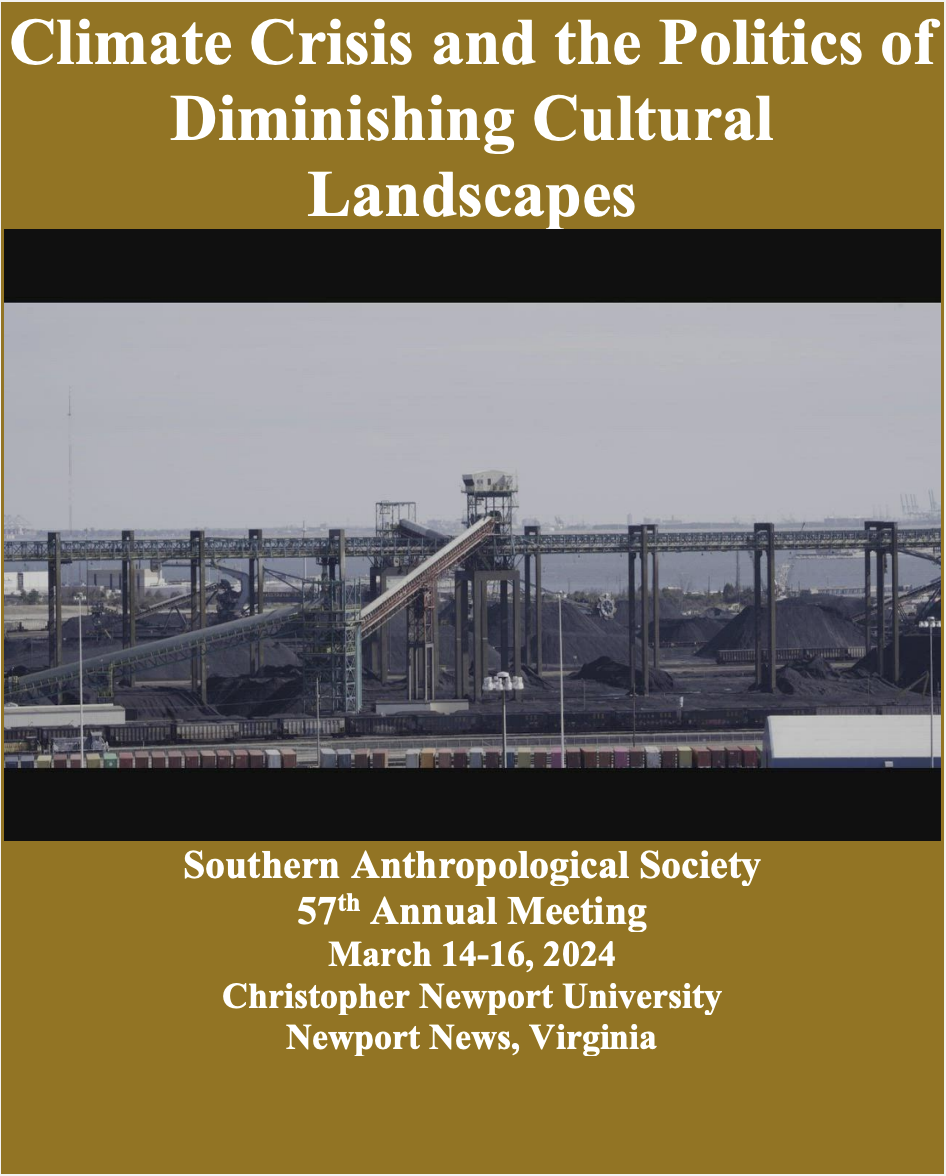
Environmental Relationships
Presentation Location
David Student Union: Washington Room
Document Type
Event
Start Date
15-3-2024 8:30 AM
End Date
15-3-2024 10:00 AM
Description
(Marjorie Snipes, Session Chair)
- Marjorie M. Snipes (University of West Georgia). “Young Gardeners” in a Weary World: The Cultural Revival of Herbalism in the U.S.
Thomas Jefferson kept a garden book from 1766 to 1824, connecting a very public, even global, life with an intimate, local attunement to roots, leaves, soils, and seasons. Agrarian concerns such as these framed the founding of the U.S. but began declining with the rise of urbanization, industrialization, and an increasingly migratory population. Although interest in plants for food and medicine has had several revivals in our history, the recent cultural renaissance of herbalism for health and medicine has involved turning back towards things such as local sourcing, organic production, and folk wisdom - and towards a new kind of holistic wisdom-knowledge. This paper explores the growth of the herbal industry in the U.S. over the past thirty years, focusing specifically on the blending and transmission of scientific and folk epistemologies in a uniquely Western setting. - William H. Westermeyer (University of South Carolina). A Field Guide to Environmental Relationships: A Framework for Student Engagement and Action
Given its holistic nature, anthropology can provide students with a diverse toolkit for understanding the relationships between humans, the earth, other species, and more than human worlds. This paper is a sketch of a book collaboration whose aim is to provide students with a "field guide" to investigate environmental challenges. This presentation is framed to garner feedback from conference participants regarding different entry points for investigating such diverse topics as climate change, species extinction, genetically modified organisms, etc. The purpose is to investigate examples of several entry points for thoughtful analysis including different physical scales, timescales, relationships of power and economics, and the diverse conceptions of nature and identity. The goal is to provide students with a framework through which to orient themselves to environmental action. - Marcos Mendoza (University of Mississippi). Mountaineering in the Andes: Risking Death and Memento Mori Figures
This paper examines the social construction of death in Andean mountaineering (andinismo). I argue that andinista deaths are made meaningful to the action spaces of mountaineering through their conversion into memento mori figures. Memento mori figures establish the significance of particular deaths as they circulate as public narratives. These narratives: 1) provide explanatory causal or probabilistic frameworks for why certain deaths occurred; 2) highlight the conduct of the deceased and how they embodied the core values of the sport; and 3) give authoritative warnings about what went wrong during a climb. These narrative elements contribute to the ongoing development of an epistemic culture of mountaineering in which awareness of death is linked to knowledge of Andean environments, the dangers faced, and efforts to limit risk exposure.
Recommended Citation
Snipes, Marjorie; Westermeyer, William H.; and Mendoza, Marcos, "Environmental Relationships" (2024). Annual Meeting of the Southern Anthropological Society. 7.
https://egrove.olemiss.edu/southernanthro_meeting/2024/schedule/7
COinS
Mar 15th, 8:30 AM
Mar 15th, 10:00 AM
Environmental Relationships
David Student Union: Washington Room
(Marjorie Snipes, Session Chair)
- Marjorie M. Snipes (University of West Georgia). “Young Gardeners” in a Weary World: The Cultural Revival of Herbalism in the U.S.
Thomas Jefferson kept a garden book from 1766 to 1824, connecting a very public, even global, life with an intimate, local attunement to roots, leaves, soils, and seasons. Agrarian concerns such as these framed the founding of the U.S. but began declining with the rise of urbanization, industrialization, and an increasingly migratory population. Although interest in plants for food and medicine has had several revivals in our history, the recent cultural renaissance of herbalism for health and medicine has involved turning back towards things such as local sourcing, organic production, and folk wisdom - and towards a new kind of holistic wisdom-knowledge. This paper explores the growth of the herbal industry in the U.S. over the past thirty years, focusing specifically on the blending and transmission of scientific and folk epistemologies in a uniquely Western setting. - William H. Westermeyer (University of South Carolina). A Field Guide to Environmental Relationships: A Framework for Student Engagement and Action
Given its holistic nature, anthropology can provide students with a diverse toolkit for understanding the relationships between humans, the earth, other species, and more than human worlds. This paper is a sketch of a book collaboration whose aim is to provide students with a "field guide" to investigate environmental challenges. This presentation is framed to garner feedback from conference participants regarding different entry points for investigating such diverse topics as climate change, species extinction, genetically modified organisms, etc. The purpose is to investigate examples of several entry points for thoughtful analysis including different physical scales, timescales, relationships of power and economics, and the diverse conceptions of nature and identity. The goal is to provide students with a framework through which to orient themselves to environmental action. - Marcos Mendoza (University of Mississippi). Mountaineering in the Andes: Risking Death and Memento Mori Figures
This paper examines the social construction of death in Andean mountaineering (andinismo). I argue that andinista deaths are made meaningful to the action spaces of mountaineering through their conversion into memento mori figures. Memento mori figures establish the significance of particular deaths as they circulate as public narratives. These narratives: 1) provide explanatory causal or probabilistic frameworks for why certain deaths occurred; 2) highlight the conduct of the deceased and how they embodied the core values of the sport; and 3) give authoritative warnings about what went wrong during a climb. These narrative elements contribute to the ongoing development of an epistemic culture of mountaineering in which awareness of death is linked to knowledge of Andean environments, the dangers faced, and efforts to limit risk exposure.

